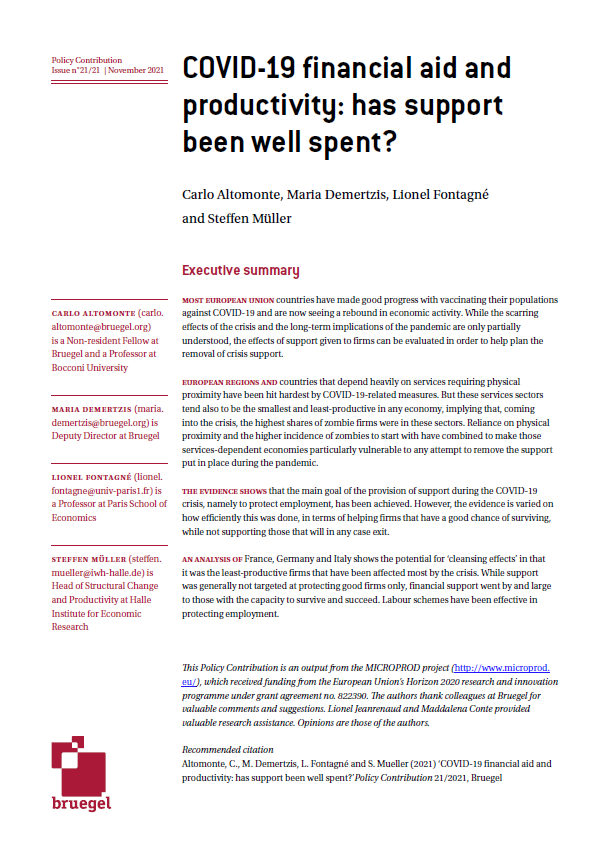Blog Post
The European Union must defend Andreas Georgiou
Andreas Georgiou’s case raises disturbing questions about the integrity of European statistical processes. Forceful action by EU authorities on Mr Georgiou’s case is long overdue. The European Union also needs to consider reforming its statistical framework to ensure a similar scandal cannot recur.
Relentless prosecutions in Greece against Andreas Georgiou, the highly respected former head of the country’s national statistical institute ELSTAT, are more than a matter of shameful harassment by Greece. His case raises disturbing questions about the integrity of European statistical processes. Forceful action by EU authorities on Mr Georgiou’s case is long overdue. The European Union also needs to consider reforming its statistical framework to ensure a similar scandal cannot recur.
Mr Georgiou’s legal ordeal began in 2011, and has included accusations of inflating Greece’s 2009 budget deficit – a key figure in the context of the country’s loss of financial market access and request for financial assistance in 2010 – and of ‘violating his duty’ by not respecting ELSTAT procedures. The sequence of legal developments, interwoven with Mr Georgiou’s scapegoating by several Greek political leaders, is too long to be summarised here; it is documented on the website of the Friends of Greece, a dedicated advocacy group.
A new low was recently reached when Greece’s Supreme Court irrevocably rejected Mr Georgiou’s request for annulment of his Appeals Court conviction for having refused to submit Greece’s 2009 government deficit and debt numbers for prior approval to ELSTAT’s politically appointed board. He was also given a two-year suspended prison sentence. But in doing what he did, Mr Georgiou was merely following the European Statistics Code of Practice, which assigns “sole responsibility” to heads of National Statistical Institutes (NSIs, such as ELSTAT) and which had been endorsed under Greek law prior to these events. Furthermore, the same figures and methodologies used by Mr Georgiou’s ELSTAT to produce the deficit and debt numbers have been subsequently used by the Greek government, including as the basis for European and international financial assistance and debt relief.
While Greece and its Supreme Court have justifiably been criticised by numerous international commentators on this sinister drama, and a recent petition has collected over a thousand signatures – including from nine Nobel laureates in economics – the flaws it reveals in the EU statistical architecture go well beyond one country. The concern is especially relevant for the euro area, where joint economic policies rely critically on the accuracy of national statistics aggregated (but not collected) by Eurostat. Information is the lifeblood of policymaking. If statistics on such items as economic growth, budget deficits, and sovereign debts cannot be relied upon, the euro area cannot have a good fiscal framework or sound monetary policy.
Eurostat is a Directorate-General of the European Commission and the central hub of the European Statistical System (ESS), a formal partnership of 347 national and subnational authorities in 32 participating countries (the European Union plus Iceland, Liechtenstein, Norway, and Switzerland), of which 201 entities are in the euro area. These participants include each country’s national statistical institutes (NSI) and a highly variable number of other public bodies, employing an estimated 46,300 staff Europe-wide as of 2015. Eurostat, which has around 800 employees of its own in Luxembourg, can exercise a degree of quality control over the network’s other members, including limited scope for on-site investigations and fines in cases of malpractice, under new EU legislation adopted in the wake of the Greek crisis of 2009-10.
Mr Georgiou’s case, however, exposes the inadequacy of the existing safeguards in the real world of Europe’s statistical politics. This is not about any ambiguous grey area but entirely and simply about the integrity of statistics and the independence of statistical authorities. The EU system is failing the most basic test of its ability to withstand political pressure. Moreover, it would be naïve to think that such things can happen only in Greece. As Mr Georgiou himself has noted: “Official statisticians everywhere in the world are facing the same pressures because they basically construct the picture of reality. And people who have power, or want to have power, want to control that version of reality.”
It is thus troubling how little the European Union appears to have done about it. The European Commission’s only known initiative was to send a letter to Greece’s (then and now) finance minister Euclid Tsakalotos in August 2016, about which Commissioner Marianne Thyssen made public comments. That action came late in the sequence of events, and only after significant international media coverage and public outcry about Mr Georgiou’s sorry situation. Neither the Commission’s letter nor Mr Tsakalotos’s response have been made public, and there is no indication that the Commission has followed up on this exchange in any meaningful way. A comment by Commission vice-president Valdis Dombrovskis in August 2017 that the independence of NSIs “is protected in EU law [and] cannot be challenged” is squarely contradicted by what is happening to Mr Georgiou. To its credit, the European Parliament has paid more sustained attention, calling Mr Georgiou to testify and publishing two well-documented summaries of the case. A written question was jointly sent by 12 members of the European Parliament to the European Commission in October 2017. Commissioner Pierre Moscovici’s response four months later sadly did not signal any intent to act.
Similarly, Eurostat has not publicly reacted to the alarming judicial developments of the past three years or since Mr Georgiou left ELSTAT. Eurostat’s most recent public pronouncements on the matter appear to be the statements by its then director-general in January 2013 and jointly by ESS principals (including Eurostat’s head) in February 2013 and May 2015. This reticence is in striking contrast to numerous recent public expressions of concern and support for Mr Georgiou from the International Statistical Institute, the American Statistical Association, multiple regional statistical bodies, as well as two consultative bodies of the ESS, the European Statistical Governance Advisory Board and the European Statistical Advisory Committee.
On June 22nd 2018, the Eurogroup adopted a statement on the completion of the financial assistance programme to Greece and debt relief. Somewhat encouragingly, this statement makes specific reference to Mr Georgiou’s situation, but the language remains too vague for comfort. The European Union, including the European Commission and its statistical arm, need to more assertively defend Mr Georgiou and, beyond him, the integrity of national statistics compiled by independent statistical agencies. Respect for the Greek justice system, despite its glaring flaws, must not constrain Brussels and Luxembourg to silence. They can and should do more.
First, responsible EU officials should publicly declare that what has happened, including the latest Supreme Court judgment, is offensive to common sense and sensible public policy. Eurostat, in particular, must break out of its deafening silence of the past few years.
Second, future European financial assistance and debt relief to Greece, along the lines announced on June 22nd, should be conditional on the Greek government publicly and unambiguously confirming what any minimally informed observer already knows (and what Eurostat has attested), namely that all the figures Mr Georgiou’s ELSTAT produced were correct both in substance and process. This would help end absurd conspiracy theories about these figures, which have a surprisingly large number of followers in Greece. Indeed, the Greek president – as is within his power – could and should render Mr Georgiou’s conviction null and void. The European Parliament could also do more, for example, by calling Mr Georgiou’s Greek tormentors to testify and possibly by blocking EU financing to Greece as long as the case is not resolved satisfactorily.
Third, the European Commission should recognise Mr Georgiou’s service to the EU public interest by covering his legal fees. Last year Greece’s creditors extracted a commitment from Athens to contribute to covering these costs, but the resulting Greek legislation made the covering of Mr Georgiou’s legal fees conditional on him winning the cases, creating a perverse incentive for courts to convict him in order to minimise the burden on the Greek taxpayer. (A bitter irony is that the same initiative of the creditors enabled the Greek government to reimburse Mr Georgiou’s accusers instead.)
Fourth, the Commission should belatedly act on Mr Dombrovskis’s above-quoted strong words that ELSTAT’s independence is protected by EU law. It should open an infringement case against Greece for failing to create and support the conditions that ensure the production of European statistics with professional independence, impartiality, and objectivity.
Fifth, the European Union should ensure that another similar fiasco does not happen in the future, in Greece or any other Member State. As Mr Georgiou has himself suggested, the European Commission should propose EU legislation that would shield national statisticians in all EU Member States from prosecution for their European statistical work, when that work has been performed in compliance with the EU statistical framework and been duly validated by EU institutions.
Sixth, the European Union should open a far-ranging debate on whether and what additional structural changes to the ESS may be needed in order to ensure the immunity of official statistics to manipulation and pressure from national governments and political interests. Even with the additional protections suggested above, a more integrated structure may be required for at least some critical statistical functions. An imperfect comparison is provided by the corporate world; in many international businesses, local financial controllers used to report to local management – but with increased corporate complexity, cross-border integration, and enabling technology, financial controllers now typically report directly to headquarters. It may be time for the ESS to envisage a similar shift.
There is no need to emphasise how harmful Mr Georgiou’s case has already been to Greece’s international reputation, not least as the country seeks to regain access to international financial markets. But it is often overlooked that the European Union is being damaged as well. It is high time EU leaders discharged their responsibilities and ensured that EU statistics are taken seriously.
Republishing and referencing
Bruegel considers itself a public good and takes no institutional standpoint. Anyone is free to republish and/or quote this post without prior consent. Please provide a full reference, clearly stating Bruegel and the relevant author as the source, and include a prominent hyperlink to the original post.












